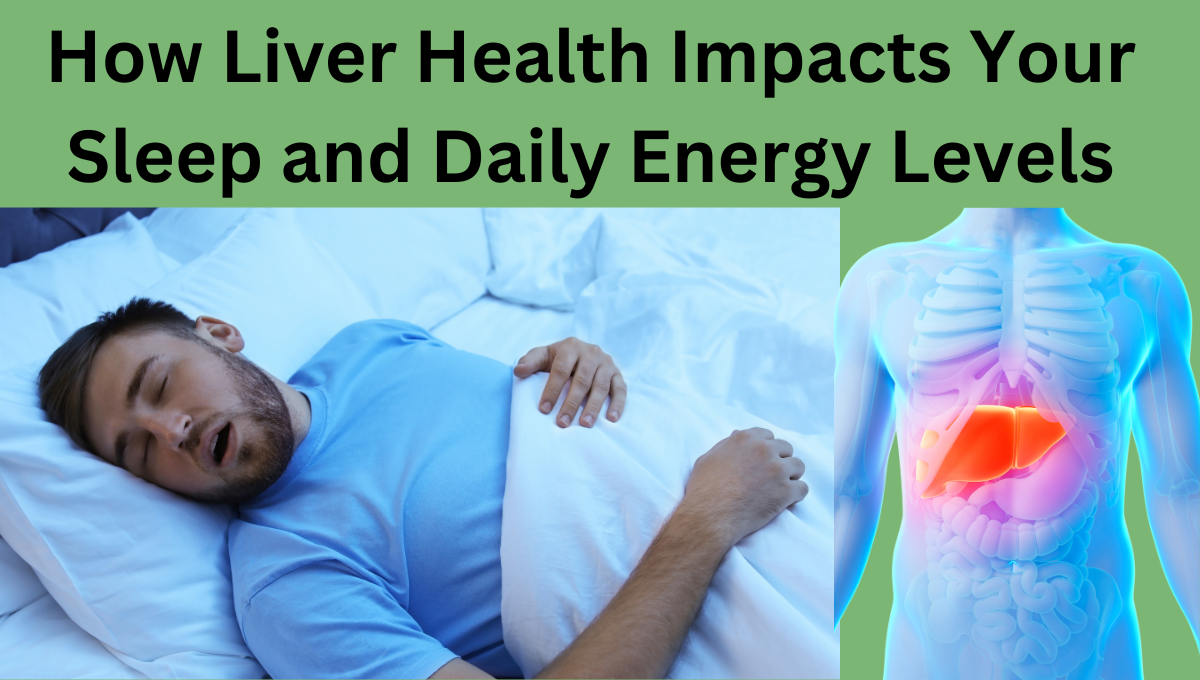How Liver Health Impacts Your Sleep and Daily Energy Levels
Overview
One of the body’s hardest-working organs, the liver is essential for energy production, metabolism, and cleansing. However, a lot of individuals are unaware that their daily energy levels and the quality of their sleep are directly impacted by the condition of their liver. Your sleep habits may be disturbed, and you may experience daytime exhaustion if your liver isn’t working at its best.
This article explores the relationship between energy, sleep, and liver function and explains how to take care of your liver for improved general health.
The Function of the Liver in the Regulation of Energy and Sleep
- Production of Energy
A metabolic powerhouse, the liver is in charge of:
converting carbs into glucose, the body’s energy source.
storing glycogen, which is released when blood sugar levels fall and serves as a backup energy source.
breaking down proteins and lipids to create more energy.
These processes slow down if the liver is overworked or sluggish, leaving you exhausted.

- Sleep and Detoxification
Toxins, hormones, and waste materials are all filtered out of the blood by the liver. According to traditional Chinese medicine, this detoxification process is most active at night, especially between 1 and 3 a.m. This overnight activity can cause sleep problems, including frequent awakenings or restless sleep, when the liver is overworked. - Regulation of Hormones
Your sleep-wake cycle is influenced by hormones that are regulated by the liver, such as melatonin and cortisol. Hormone imbalances caused by liver disease can interfere with circadian rhythms, making it more difficult to fall asleep or maintain energy levels during the day.
Indications Your Liver Could Be Impacting Your Energy and Sleep
If your liver isn’t functioning at its best, you might observe:
frequent exhaustion, even after sleeping through the night.
inability to stay asleep or fall asleep.
awakening during the hours of 1 and 3 a.m., which is associated with liver activity.
Lack of mental clarity or brain fog during the day.
irritation or mood fluctuations, frequently brought on by hormone abnormalities.
These symptoms could be an indication that your liver is stressed and interfering with your body’s normal cycles.
Factors Associated with Sleep and Fatigue and Poor Liver Health

- Overload of Toxins
The liver removes poisons from the body, but its effectiveness decreases when it is overworked—by bad food, alcohol, drugs, or environmental conditions. This may interfere with detoxification at night and result in insomnia. - Imbalances in Blood Sugar
Stable blood sugar levels are maintained in part by the liver. Blood sugar swings might cause sluggishness during the day and hunger or restlessness at night if it’s not working properly. - Fatty Liver Disease Fatigue
Chronic fatigue and poor sleep quality are associated with non-alcoholic fatty liver disease (NAFLD), a prevalent disorder in which fat accumulates in the liver. NAFLD impairs the liver’s capacity to efficiently digest energy, which results in chronic fatigue. - Disruptions to Hormones
Excess estrogen or cortisol can result from impaired liver function, and both can disrupt healthy sleep and energy levels during the day. - Stress and Inflammation
The neural system may be affected by chronic liver inflammation, which can lead to a stress-sleep cycle.
How to Take Care of Your Liver to Get More Energy and Sleep
- Make Your Diet Liver-Friendly
One of the most important variables influencing liver health is your diet. Pay attention to:
fruits and vegetables that aid in detoxifying, including citrus fruits, beets, and leafy greens.
healthy fats from foods like olive oil, avocados, and almonds.
lean meats, such as chicken or fish, or plant-based foods, like lentils.
Whole grains provide you with a consistent energy boost.
Steer clear of:
prepared foods and too much sugar.
Fried foods with saturated fats.
One of the main liver toxins is alcohol.

- Drink plenty of water
Water consumption supports energy metabolism and detoxification by helping the liver remove toxins. - Engage in Regular Exercise
Engaging in physical activity helps lower fat accumulation and enhances blood flow to the liver. Additionally, exercise increases endorphins, which improve energy and sleep quality. Every week, try to get in 150 minutes of moderate activity. - Restrict Your Alcohol Use
The liver is severely taxed by alcohol. Reducing or stopping alcohol consumption can help your liver heal and perform better. - Give Sleep Hygiene Priority
Maintain a regular nighttime schedule.
Steer clear of coffee and large foods right before bed.
Create a peaceful sleeping space with less noise or light. - Examine Supplements to Support the Liver
Milk thistle: renowned for its ability to protect the liver.
Curcumin, an ingredient in turmeric, has anti-inflammatory properties.
Omega-3 fatty acids: Assist in lowering inflammation and liver fat.
Always get medical advice before beginning a new supplement regimen.

- Control Your Stress Levels
Prolonged stress might cause liver damage and interfere with your sleep-wake cycle. Deep breathing, yoga, and meditation are some techniques that might help lower stress and enhance liver health.
The Two-Way Relationship Between Liver Health and Sleep
It’s crucial to remember that insufficient sleep can also damage the liver, starting a vicious cycle. Lack of sleep is associated with higher levels of inflammation and oxidative stress, both of which affect liver function.
You may end this cycle and enhance your general health by giving both liver and sleep health top priority.
When to Get Medical Advice
Consult a healthcare professional if you suffer from chronic fatigue, disturbed sleep, or other symptoms of liver malfunction. Imaging studies and liver function panels are two examples of tests that might detect any problems early and enable successful treatments.
In conclusion
Your energy levels and the quality of your sleep are greatly influenced by the condition of your liver. While a stressed liver can cause sleep disturbances and chronic weariness, a healthy liver promotes hormone balance, detoxification, and energy generation.
You may improve your liver’s health and have more energy and sleep by leading a liver-friendly lifestyle that includes stress management, exercise, food, and water. You’ll see improvements in your everyday life if you begin taking care of your liver now.

